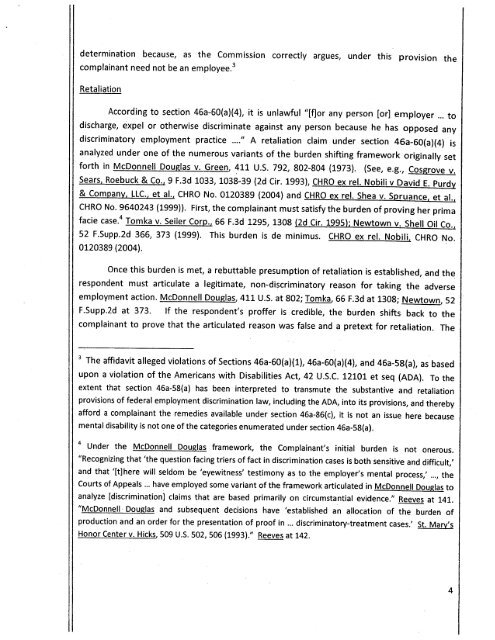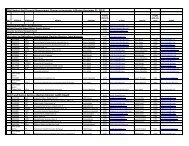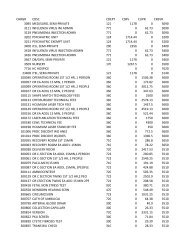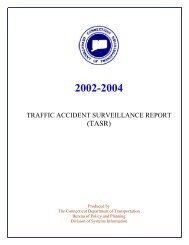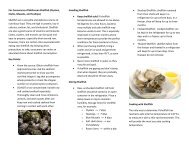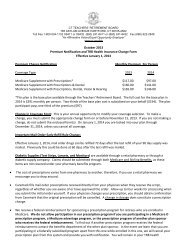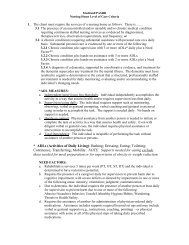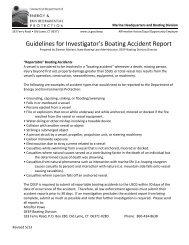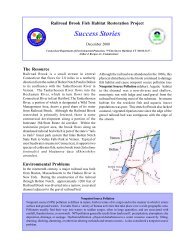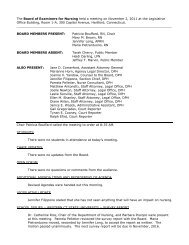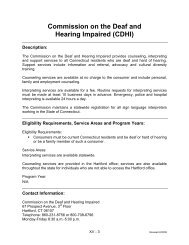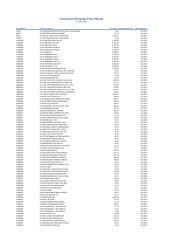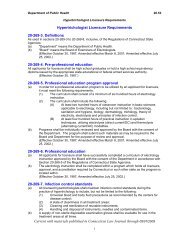STATE OF CONNECTICUT OFFICE OF PUBLIC HEARINGS - CT.gov
STATE OF CONNECTICUT OFFICE OF PUBLIC HEARINGS - CT.gov
STATE OF CONNECTICUT OFFICE OF PUBLIC HEARINGS - CT.gov
Create successful ePaper yourself
Turn your PDF publications into a flip-book with our unique Google optimized e-Paper software.
determination because, as the Commission correctly argues, under this provision the<br />
complainant need not be an employee.3<br />
Retaliation<br />
According to section 46a-60(a)(4), it is unlawful "[f]or any person [or] employer ... to<br />
discharge, expel or otherwise discriminate against any person because he has opposed any<br />
discriminatory employment practice ...." A retaliation claim under section 46a-60(a)(4) is<br />
analyzed under one of the numerous variants of the burden shifting framework originally set<br />
forth in McDonnell Douglas v. Green. 411 U.S. 792, 802-804 (1973). (See, e.g., Cosgrove v.<br />
Sears, Roebuck & Co.. 9 F.3d 1033, 1038-39 (2d Cir. 1993), CHRP ex rel. Nobili v David E. Purdv<br />
& Company, LLC. et al.. CHRO No. 0120389 (2004) and CHRP ex rel. Shea v. Spruance. et al.r<br />
CHRO No. 9640243 (1999)). First, the complainant must satisfy the burden of proving her prima<br />
facie case.4 Tomka v. Seiler Corp.. 66 F.3d 1295, 1308 (2d Cir. 1995): Newtown v. Shell Oil Co.,<br />
52 F.Supp.2d 366, 373 (1999). This burden is de minimus. CHRO ex rel. Nobili. CHRO No.<br />
0120389 (2004).<br />
Once this burden is met, a rebuttable presumption of retaliation is established, and the<br />
respondent must articulate a legitimate, non-discriminatory reason for taking the adverse<br />
employment action. McDonnell Douglas, 411 U.S. at 802; Tomka, 66 F.3d at 1308; Newtown. 52<br />
F.Supp.2d at 373. If the respondent's proffer is credible, the burden shifts back to the<br />
complainant to prove that the articulated reason was false and a pretext for retaliation. The<br />
3 The affidavit alleged violations of Sections 46a-60(a)(l), 46a-60(a)(4), and 46a-58(a), as based<br />
upon a violation of the Americans with Disabilities Act, 42 U.S.C. 12101 et seq (ADA). To the<br />
extent that section 46a-58(a) has been interpreted to transmute the substantive and retaliation<br />
provisions of federal employment discrimination law, including the ADA, into its provisions, and thereby<br />
afford a complainant the remedies available under section 46a-86(c), it is not an issue here because<br />
mental disability is not one of the categories enumerated under section 46a-58(a).<br />
4 Under the McDonnell Douglas framework, the Complainant's initial burden is not onerous.<br />
"Recognizing that 'the question facing triers of fact in discrimination cases is both sensitive and difficult,'<br />
and that '[t]here will seldom be 'eyewitness' testimony as to the employer's mental process,' ..., the<br />
Courts of Appeals ... have employed some variant of the framework articulated in McDonnell Douglas to<br />
analyze [discrimination] claims that are based primarily on circumstantial evidence." Reeves at 141.<br />
"McDonnell Douglas and subsequent decisions have 'established an allocation of the burden of<br />
production and an order for the presentation of proof in ... discriminatory-treatment cases.' St. Mary's<br />
Honor Center v. Hicks. 509 U.S. 502, 506 (1993)." Reeves at 142.


